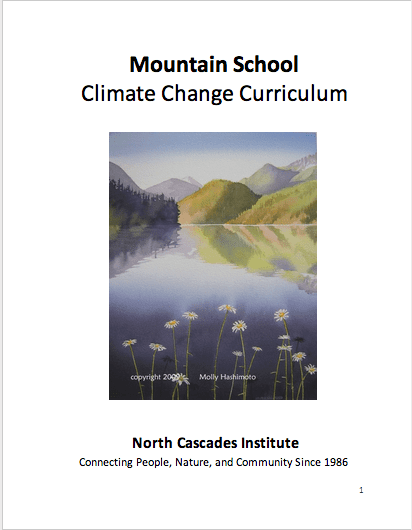What do those graduate students do all winter anyway…?
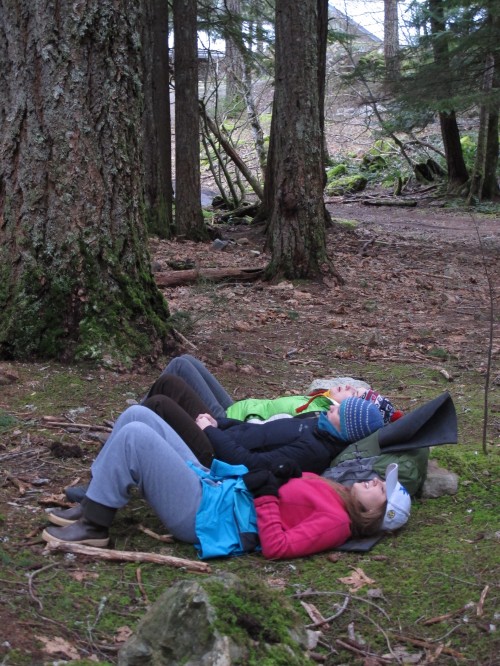
One of my favorite things about this particular Masters in Education program through Western Washington University and North Cascades Institute is that most of the time it doesn’t feel like school. Due to the non-traditional nature of this program, we don’t spend much time in a classroom, we get to hike and play outside a lot, and we get tons of real-world experience through teaching and experiential learning. So, while we’re busy and learning the whole time, it’s a few different kinds of busy.
During the fall, spring, and summer we’re busy teaching elementary-, middle-, and high school youth through several different residential and backcountry programs. Over the winter, we return to being students. This non-teaching season of our residency at the North Cascades Environmental Learning Center is when we do the bulk of our first year graduate coursework.
This winter, among the giant mountains and snow, the eight students in Cohort 12 wrote a 291-page Climate Change Curriculum that we’re going to pilot with 9th-12th graders this spring, and created our very own non-profit organizations.
Our Curriculum Class began this fall. For the first month or so we had class for two days every two weeks. We spent this time learning the theory behind curriculum and exploring “backwards design,” the curriculum model we would be using. Class started up again as soon as we came back from winter break early in the new year and we spent the whole of January and part of February writing and rewriting lesson plans. We tried out some activities on each other, presented about our curriculum at the Storming the Sound Conference in LaConnor, and gave our final presentation to our professor, instructors, and Institute staff on March 1st. Now comes the fun part of getting to try it out with actual students!
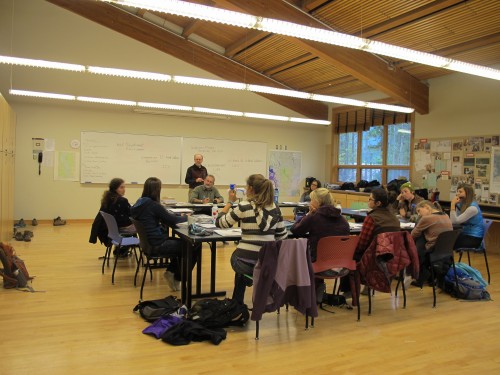 A day of curriculum in Trillium classroom at the Learning Center. Photo by Ryan Weisberg
A day of curriculum in Trillium classroom at the Learning Center. Photo by Ryan Weisberg
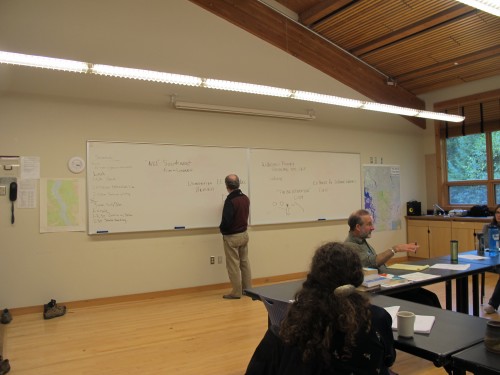 Brainstorming ideas for non-profits during our first Non-profit class. Photo by Ryan Weisberg
Brainstorming ideas for non-profits during our first Non-profit class. Photo by Ryan Weisberg
For our Non-profit class, we not only learned about non-profit organizations and how they work, but also created our own. The main components of the assignment, though there was much more to it, were to create a board and staffing plan, write up job descriptions and programs, develop a strategic plan, a budget, and bylaws, go through the process of asking one real person to be on the Board for our organization, and write a grant. This project culminates in a Foundation Interview with our instructor—North Cascades Institute Executive Director, Saul Weisberg—and other Institute staff who play the part of a foundation that’s considering our grant proposal.
We worked on this project in two groups:
“Branches to Branches,” founded by Liza Dadiomov, Cait McHugh, Sahara Suval, and Andrea Reiter, is a Tukwila, WA-based organization that focuses on project-based learning. They put environmental educators in public schools to take students on field programs. Their mission is to connect Tukwila studenta and their families to their local environment and one another through education and community stewardship.
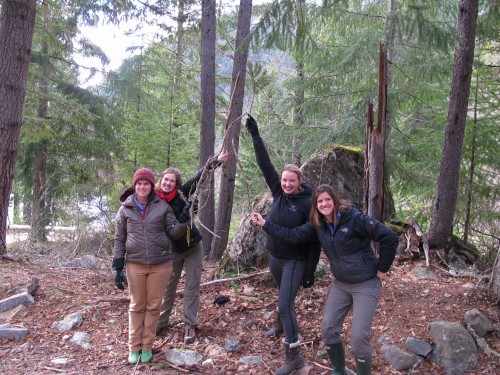 The “Branches to Branches” group posing with some…branches! (L to R: Sahara Suval, Cait McHugh, Andrea Reiter, & Liza Dadiomov) Photo by Ryan Weisberg
The “Branches to Branches” group posing with some…branches! (L to R: Sahara Suval, Cait McHugh, Andrea Reiter, & Liza Dadiomov) Photo by Ryan Weisberg
“Tulip Poplar Exploration Center,” founded by Kim Hall, Lindsay Walker, Hillary Schwirtlich, and Ryan Weisberg, is a nature preschool in Louisville, Kentucky. The Exploration Center also does teacher trainings for K-12 teachers in Louisville and has a Community Learning Garden for use by Preschool families. Their mission is to educate Louisville communities and inspire them to explore, respect, and protect nature.
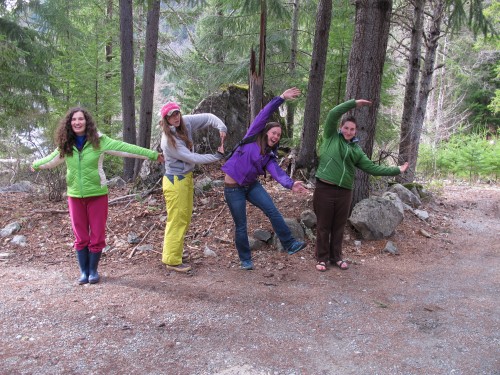 Spelling out TPEC—the much loved acronym for Tulip Poplar Exploration Center (L to R: Lindsay Walker, Kim Hall, Hillary Schwirtlich, & Ryan Weisberg) Photo by Cait McHugh
Spelling out TPEC—the much loved acronym for Tulip Poplar Exploration Center (L to R: Lindsay Walker, Kim Hall, Hillary Schwirtlich, & Ryan Weisberg) Photo by Cait McHugh
Now that these two projects have come to a close, it’s time to start thinking about teaching again—Mountain School starts in less than three weeks. Although we’ll still have some schoolwork to do and classes to attend, the bulk of our class time is done for the remainder of our residency here at the Learning Center. I’m ready for another teaching season before heading back to Western in the fall for the more traditional part of this program.
Leading photo: C12 graduate students Lindsay Walker, Andrea Reiter, and Kim Hall laying in the forest during a break from non-profit and curriculum.
Ryan Weisberg is a graduate student in his third quarter of North Cascades Institute and Western Washington University’s M.Ed. program. He grew up here in Washington, exploring the natural areas around Bellingham and in the Cascades. Ryan is the Chattermarks editor this year during his residency at the North Cascades Environmental Learning Center.


